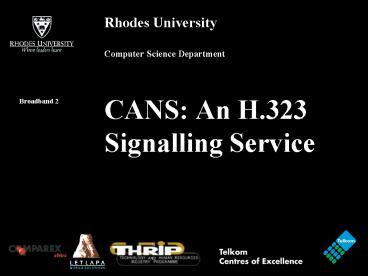CANS: An H.323 Signalling Service - PowerPoint PPT Presentation
Title:
CANS: An H.323 Signalling Service
Description:
IP communications protocol must define mechanisms to create new services ... We also acknowledge the bursary support of the National Research Foundation and Microsoft. ... – PowerPoint PPT presentation
Number of Views:37
Avg rating:3.0/5.0
Title: CANS: An H.323 Signalling Service
1
CANS An H.323 Signalling Service
Rhodes University
Computer Science Department
Broadband 2
2
Todays Presentation
- Overview
- H.323 Services
- Non-Signalling and Signalling
- Example (AlarmClock Service)
- Summary
3
Overview
- H.323 is an IP communications signalling protocol
- Without services it is simply an ancient
telephone sitting on an advanced underlying
network - waste - Services include but not limited to conventional
telephone services (CT) - IP communications protocol must define mechanisms
to create new services
4
Signalling vs. Non-signalling Services
- Non-signalling service is simply an H.323
compliant terminal with embedded intelligence - E.g. EmailReader, MarkReader
- Signalling service requires information that the
protocol itself needs to handle or pass
consistently - E.g. Call Transfer SS(H.450.2)
5
Non-signalling service Creation
- Requires limited knowledge of H.323 protocol
- Can wrap a number of conventional applications
within H.323 compliant terminal - Can develop powerful applications quickly
- Very easy to deploy no additional signalling
info
6
Signalling Service Creation
- Requires extensive knowledge of H.323 protocol
- Includes knowledge of ASN.1 structures
- Extended to other description languages (ABNF)
- Release documents to standardise new services
- Interoperability Bake-offs for product testing
- More restrictive as a result of maintaining
interoperability trade-off - Interoperability not guaranteed but recovery is
7
H.323 Std Signalling Service Mechanisms
- As of H.323 version 4, there are 3 ways of
extending the H.323 protocol messages (H.225) - H.450 - Supplementary Services (SS Framework)
- H.460 - Generic Extensibility Framework (GEF)
- Non-Standard Parameters (Property of underlying
message description ASN.1)
8
Other Std Service Creation Features
- Annexes to Recommendation H.323
- Example Annex K HTTP-Based Control of H.323
Services - Allows service providers to provide users with a
flexible way of controlling the services they use
(using HTTP) - AlarmClock service uses Annex K
9
Example Service
- Implemented a service to demonstrate the use of
the H.323 service extension mechanisms - Made use of both H.450 (SS) and H.460 (GEF)
- Finally, demonstrate the use of Annex K
- What does the service do?
10
AlarmClock Service
- A service that enables H.323 users (SoftPhone or
Telephone) to request a service (reminder) call
at a specified time on a specified device - The service (CallBack) call can be made to both
SoftPhones Telephones (extended to include SMS
messages using an MGCP SMS Gateway)
11
Example Scenario (Setup)
Invoke
ReturnError
OpenURL(Register.html)
H.323 SoftPhone
12
Example Scenario (CallBack)
Initiate H.323 Call via gateway
PSTN Telephone user
H.323 AlarmClock Server
13
ASN.1 Structure (Callback details)
14
(No Transcript)
15
ILLEGAL !!!!!
16
(No Transcript)
17
Summary
- H.323 is flexible
- Still maintains a high std of interoperability
- A wealth of really exciting services can be
developed using H.323 - H.323 is moving forward every day (lots of
industry support)
18
This work was undertaken in the Distributed
Multimedia Centre of Excellence at Rhodes
University with financial support from Telkom,
Comparex Africa, Letlapa Mobile Solutions and
THRIP.
We also acknowledge the bursary support of the
National Research Foundation and Microsoft.































